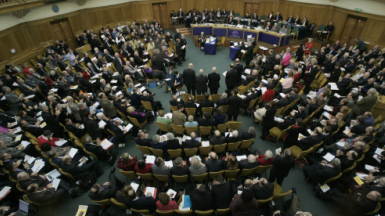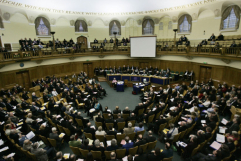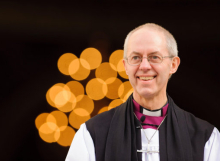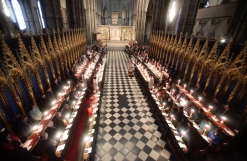
What on earth is it?
The General Synod is, possibly, a mistake. A Church dedicated to preaching Christ's message of peace, love and good news should never have got itself into the situation where its members are shouting at each other across a gilded chamber, acting for all their worldliness like their Parliamentary cousins in Westminster. But that's what happens if you succumb to the rosy apple of establishment. The Synod is the Church's parliament and it debates and passes laws, or measures, which are binding on the whole population, just like those passed by Parliament. They get debated by the Ecclesiastical Committee in Parliament and receive Royal Assent from the Queen, Supreme Governor of the Church of England. Effectively, though, the laws are all so crafted so that they are quite specific. They will affect you if you want to become a deacon, clergy person or bishop, if you want to get married in church, buy a church to convert into a house or use a church-owned premises for a party or other activity, or otherwise get personally involved.
Synod replaced the Church Assembly in 1970 and to this day has an unmistakably seventies feel about it - a surfeit of sandals and socks, fringey-type outfits, tasselled hair (for those that still have some), long layered skirts, trousers and shirts from M&S. These are lovely, holy people refusing to succumb to the cynicism of post-80s Britain and baffled at what's happened to the world outside. They have dedicated their lives to serving others and are masters and mistresses of the increasingly lost art of forgiveness. In debate after debate, they give voice to Betjeman's fading world of tea and toast, and to an endearing but often maddening Christian socialist idealism, most noticeably in debates on poverty and mission. These traits are particularly noticeable in York, when Synod meets at the university over a weekend and has a mature-studenty feel to it.
Synod's big problem is that it doesn't make any money for anyone and actually costs quite a lot, which in a world where monetisation is king, probably means it's heading ultimately for the scaffold. It does approve the Church's overall budget, however and also has the final say over authorised liturgy, not that every church takes any notice of that any more. Catch it while you can.
Sounds, well, fascinating. Who goes?
There are nearly 500 members, consisting of about 50 diocesan and suffragan bishops and roughly equal numbers of clergy and laity. There are the Archbishops of Canterbury and York, and officers of the Church who are equivalent to civil servants - think "Yes Lord" instead of "Yes Minister." There are bewigged lawyers who rule on bewildering regulations surrounding amendments, speakers, votes and motions for closure or motions to move to other business - a handy way to shelve something you don't like.
In addition, there are the journalists from The Church Times, The Tablet, Christian Today, Anglican Mainstream, the Church of England Newspaper and increasing numbers of websites and specialist publications, often representing a particular party or lobby. This Synod will also have a strong contingent from the national press and broadcast institutions because of the women bishops vote, although many nationals are by and large giving up on this arcane institution, either because they can't be bothered to understand it any more, or their unchurched readers simply are no longer interested.
Well I'm interested. How do you join up?
It's democratic, yet it isn't.
There are three ways to become a member.
You can get to be a bishop though as of writing this, that still rules out half the population.
You can become ordained and persuade the other clergy in your diocese to vote for you at the synod elections. To do that you will have to become popular with the other clergy, or have something to offer them, not always the easiest task in the world. Holding strong beliefs on aspects of doctrine can be an asset or a liability, depending on which diocese you land up in. If you go on synod as a priest you will probably have to give up on any ambition to become a bishop unless you are exceptionally wise and always have the Archbishop of Canterbury, or specifically this Archbishop of Canterbury, stand up and agree with you. You will have to learn never to lose your temper unless you are losing it in the name of Christ and doing a synodical equivalent of overturning tables but that is a risky strategy at the best of times. You will have to learn to say memorable things, yet things that no journalist notices because it is not a good idea to get in the papers all the time while your boring bishop or archdeacon doesn't.
Finally, you can become a member of that naughty House of Laity that few outside the Church knew existed until it actually did overturn an enormous heavily-laden table and crashingly threw over the last attempt to consecrate women bishops in November. HoL is an elected body but not as you would expect. The parishioners on electoral rolls can only elect members to deanery and diocesan synods. It is the deanery synods that then elect lay members to the synod. In a world where even some regular Anglican churchgoers might never have heard of deanery synods, let alone know who their elected members are, a person has to be truly committed to take this route to synod. It is almost less trouble to become bishop. Members of the House of Laity on General Synod deserve much respect.
That sounds straightforward enough. What will we talk about when we get there?
The main item on the agenda is the legislation to consecrate women bishops. Anyone with any ecclesiological sense actually recognises the laity did the right thing last time. The previous legislation was long, complex and generally pretty poor. Truly the laity should be acknowledged as brave. But it was perceived publicly as a disaster and led to weeks of behind-the-scenes work by the Archbishop of Canterbury's new man charged with reconciliation, Canon David Porter, who cut his teeth negotiating peace in Northern Ireland. Yes, it has got that bad behind the scenes in the once fluffy, cuddly CofE. No-one is taking a "yes" vote for granted but it does seem likely it will go through this time.
The synod will also debate a new baptism service that has cast out the devil, from the liturgy not the babies, but left in some mention of sin. There will be discussion of clergy discipline. And rather excitingly, there is a presentation on the (Un)Common Good by the Rev Jim Wallis, from the US Sojourners' movement. That will be on Saturday, so expect everyone still to be in a good, spirit-filled mood by Monday when the crucial vote takes place.
What about in groups? Who shall I hang out with?
Behind the scenes there are many different groupings but they are not as demarcated as they were two decades ago. Before the women priests vote in 1992, the Synod was clearly divided between evangelical, liberal and catholic. These divisions were not necessarily a good thing for the Church though they did make it easier to understand. The catholic wing took a terrible hammering over women priests and while it is not reasonable to regret that vote, the departure of many of these priests to Rome, Orthodoxy or to secular life was a terrible loss to the Church and also cost a substantial sum, as on that occasion they received compensation.
Some wonder whether the Church can ever truly recover from this loss of the heart of its catholic wing, given that many laity left with them. Inevitably, the balance has since swung to the evangelical and liberal groupings which have themselves changed and re-grouped and are not easily classifiable, with open evangelicals occupying some position half way between the two, liberal catholics still persevering with their lovely and humble 19th century social action and spirituality, and conservative evangelicals commanding the interest and energy that must attend all bodies with a political structure, however ostensibly spiritual. This Archbishop of Canterbury, remarkably, straddles all these divides, but his footprint is slightest on the liberal ground.
Anything else I'll have to get to grips with?
There is no rest for the good. In between debates, before and after them, from early in the morning until pushing midnight, there is prayer, worship and meetings of special interest groups. Religious publishers attempt to sell their wares, others promote their programmes, their "fresh expressions" of church. People such as Messy Church give presentations in fringe meetings, while special interest groups, such as those campaigning for inclusion or exclusion, invite guests from the wider church to speak at their meetings. Some of the most impressive work gets done at these meetings and the passion and commitment is awe-inspiring.
This time one of the most important comes on the back of the debate over education and radicalisation in Birmingham and will explore "Effective Religious Education in a Multi-Cultural Society and the need for a complementary Religious Education Review." Led by the Bishop of Birmingham David Urquhart, the meeting will hear detailed and expert expositions on the faith-based Birmingham approach to RE and how it can help other parts of the country. This might get little publicity, given it is happening also on Monday and competing with women bishops, yet it is arguably as important as anything else happening there this time. ChristianToday will attempt to cover this for its readers.
What happens after hours? Does everyone go clubbing or what?
Members of Synod stay in student accommodation from Friday to Monday night. Every hall has its own bar and restaurant, and every bar its own character. Part of the fun of synod in York is working out which bar is favoured by evangelicals, which by liberals, which by bishops and which by the press. Occasionally the ambitious clerics and politically clever laity can be spotted, walking hurriedly from one to the other at the dead of night, as the vital business of synodical schmoozing takes place. In spite of the genuinely-meant, previously-stated description of members as holy - they really, truly are the sainted ones of our society - it would be doing readers here a disservice to pretend that gossip does not take place. It does and it is wonderful. After all, they are at heart, mere humans. But it is all said and done in prayer, mindful of the Lord.

















